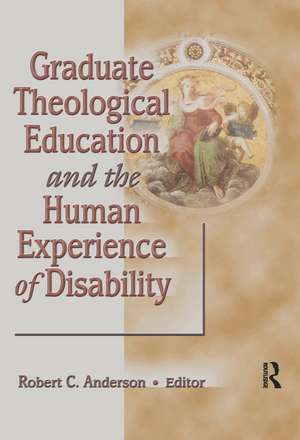Graduate Theological Education and the Human Experience of Disability
Autor Robert C. Andersonen Limba Engleză Paperback – 17 noi 2003
Graduate Theological Education and the Human Experience of Disability examines graduate schools of theology and their limited familiarity with the study of disability—and the presence of people with disabilities in particular—on their campuses. Dubbed a “missing note” by one theologian, this text offers critical research and illuminates new pathways for theologia and practice in the community of faith. Reviews of previous literature, theology, and practices illuminate how people with disabilities have historically been marginalized by the religious community. Theologians, people with disabilities, and researchers offer suggestions for incorporating disability studies into theological education and religious life.
This text contains firsthand testimony from people with disabilities who are the necessary sources of wisdom for overcoming barriers. By infusing education into existing theological curriculum, seminaries may better prepare their students for leadership and ministry in their congregations. People with disabilities number 18% of the population, yet represent only 5-7% of congregational membership.
This book explores aspects of theology and disability such as:
- the challenges faced by theological schools that desire to improve both theological curriculum and facilities
- a review of literature that connects theology and disability—from sources such as scripture, history, faith traditions, and social theory
- the various ideologies that shape the way the human body is understood—redefining “normal” in theological education
- an overview of critical boundaries that mark the limits and possibilities for theological inquiry about the human experience of disability
- creative concepts that religious communities may use to better include people with disabilities and their families
- how the religious community may benefit from the gifts, talents, and leadership of people with disabilities
Preț: 313.60 lei
Preț vechi: 422.74 lei
-26% Nou
Puncte Express: 470
Preț estimativ în valută:
60.03€ • 65.22$ • 50.45£
60.03€ • 65.22$ • 50.45£
Comandă specială
Livrare economică 31 martie-14 aprilie
Doresc să fiu notificat când acest titlu va fi disponibil:
Se trimite...
Preluare comenzi: 021 569.72.76
Specificații
ISBN-13: 9780789060105
ISBN-10: 0789060108
Pagini: 134
Dimensiuni: 148 x 210 x 9 mm
Greutate: 0.2 kg
Ediția:1
Editura: Taylor & Francis
Colecția Routledge
Locul publicării:Oxford, United Kingdom
ISBN-10: 0789060108
Pagini: 134
Dimensiuni: 148 x 210 x 9 mm
Greutate: 0.2 kg
Ediția:1
Editura: Taylor & Francis
Colecția Routledge
Locul publicării:Oxford, United Kingdom
Cuprins
- Introduction: A Look Down the Road (Robert C. Anderson)
- Access to Professional Education (Harold H. Wilke)
- Integrating Welcome into the Seminary Curriculum (Bruce C. Birch)
- In Search of the Disabled Human Body in Theological Education: Critical Perspectives on the Construction of Normalcy—An Overview (Robert C. Anderson)
- Toward a Theology That Includes the Human Experience of Disability (Deborah Creamer)
- Christian Theology and Human Disability: A Literature Review (W. Daniel Blair)
- Healing and Hospitality in Jesus’ Ministry (Bruce G. Epperly)
- Inclusiveness as Hospitality in Worship Settings (Laurence Hull Stookey)
- Each Made in God’s Image, Each a Unit of God’s Grace (Lu Leone with Ginny Thornburgh)
- Index
- Reference Notes Included
Descriere
Graduate Theological Education and the Human Experience of Disability examines graduate schools of theology and their limited familiarity with the study of disability—and the presence of people with disabilities in particular—on their campuses. Dubbed a “missing note” by one theologian, this text offers critical research and illuminates new pathways for theologia and practice in the community of faith. Reviews of previous literature, theology, and practices illuminate how people with disabilities have historically been marginalized by the religious community. Theologians, people with disabilities, and researchers offer suggestions for incorporating disability studies into theological education and religious life.
